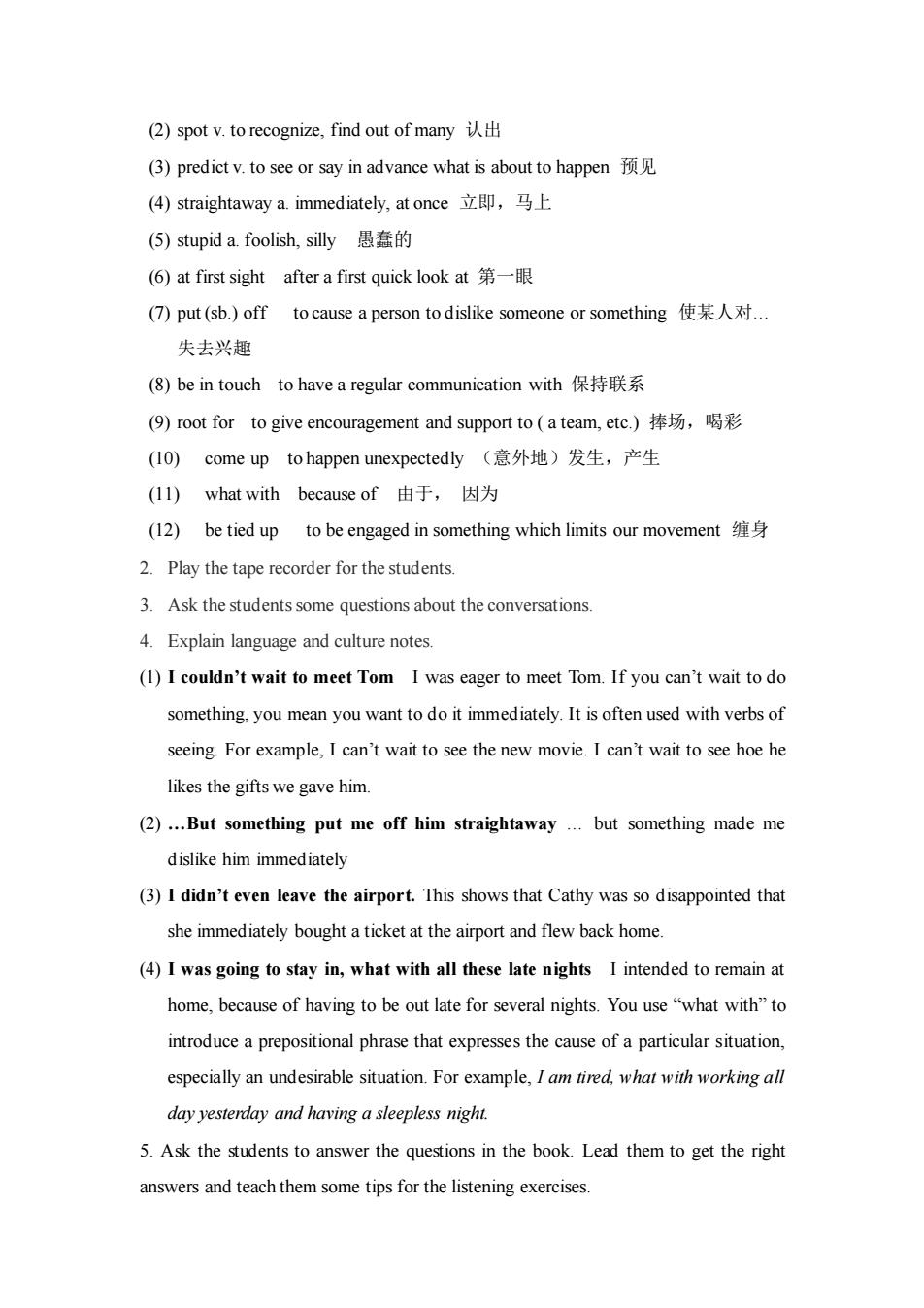正在加载图片...

(2)spot v..to recognize,find out of many认t出 (3)predict v.to see or say in advance what is about to happen (4)straightaway a.immediately,at once立即,马上 (⑤)stupid a.foolish,sily愚蠢的 (6)at first sight after a first quick look at第一眼 (7)put(sb.)off to cause a person to dislike someone or something使某人对. 失去兴趣 (8)be in touch to have a regular communication with保持联系 (9)root for to give encouragement and support to(a team,etc,)捧场,喝彩 (O)come up tohappen unexpectedly(意外地)发生,产生 (I)what with because of由于,因为 (12)be tied up to be engaged in something which limits our movement 2.Play the tape recorder for the students. 3.Ask the students some questions about the conversations 4.Explain language and culture notes. (1)I couldn't wait to meet Tom I was eager to meet Tom.If you can't wait to do something,you mean you want to do it immediately.It is often used with verbs of seeing.For example,I can't wait to see the new movie.I can't wait to see hoe he likes the gifts we gave him. (2)..But something put me off him straightaway.but something made me dislike him immediately (3)I didn't even leave the airport.This shows that Cathy was so disappointed that she immediately bought a ticket at the airport and flew back home. (4)I was going to stay in,what with all these late nights I intended to remain at home,because of having to be out late for several nights.You use"what with"to introduce a prepositional phrase that expresses the cause of a particular situation, especially an undesirable situation.For example,I am tired.what with working all day yesterday and having a sleepless night. 5.Ask the students to answer the questions in the book.Lead them to get the right answers and teach them some tips for the listening exercises. (2) spot v. to recognize, find out of many 认出 (3) predict v. to see or say in advance what is about to happen 预见 (4) straightaway a. immediately, at once 立即,马上 (5) stupid a. foolish, silly 愚蠢的 (6) at first sight after a first quick look at 第一眼 (7) put (sb.) off to cause a person to dislike someone or something 使某人对… 失去兴趣 (8) be in touch to have a regular communication with 保持联系 (9) root for to give encouragement and support to ( a team, etc.) 捧场,喝彩 (10) come up to happen unexpectedly (意外地)发生,产生 (11) what with because of 由于, 因为 (12) be tied up to be engaged in something which limits our movement 缠身 2. Play the tape recorder for the students. 3. Ask the students some questions about the conversations. 4. Explain language and culture notes. (1) I couldn’t wait to meet Tom I was eager to meet Tom. If you can’t wait to do something, you mean you want to do it immediately. It is often used with verbs of seeing. For example, I can’t wait to see the new movie. I can’t wait to see hoe he likes the gifts we gave him. (2) …But something put me off him straightaway … but something made me dislike him immediately (3) I didn’t even leave the airport. This shows that Cathy was so disappointed that she immediately bought a ticket at the airport and flew back home. (4) I was going to stay in, what with all these late nights I intended to remain at home, because of having to be out late for several nights. You use “what with” to introduce a prepositional phrase that expresses the cause of a particular situation, especially an undesirable situation. For example, I am tired, what with working all day yesterday and having a sleepless night. 5. Ask the students to answer the questions in the book. Lead them to get the right answers and teach them some tips for the listening exercises